Carreg Lafar’s Profiad
Robin Flower & Libby McLaren’s Steelhead in the Riffles
Ken Kolodner’s Journey to the Heartland
Various artists’ The Independence Suite
Brendan Begley’s We Won’t Go Home Til Morning
Rosie Shipley and Matt Mulqueen with Peter and Trevor Shipley’s At Home
Rosheen’s Musique Celtique
Dochas’s The Second Glance
Iain MacKintosh’s Gentle Persuasion
Jim Reid’s Yont the Tay
Finlay MacDonald, Simon McKerrell, & Chris Gibb’s Highland Games
 I don’t think it is either right or fair to file Celtic music all under one hat, as the variety in these albums illustrates. In this review I look at a double handful of them, all different in their own way.
I don’t think it is either right or fair to file Celtic music all under one hat, as the variety in these albums illustrates. In this review I look at a double handful of them, all different in their own way.
Truly Carreg Lafar’s Profiad is an album for all you Welsh-speaking Celtic fans. Although I live on the English side of the border of North Wales, and in my experience the Welsh language is more widely spoken up here, I had never heard Carreg Lafar before. I have to say I am quite impressed with the album. Carreg Lafar is a Cardiff-based band with five members: Linda Owen on lead vocals, Rhian Evan-Jones on fiddle and vocals, James Rouke on flute, whistle and vocals, Dylan Davies on guitar and vocals, and Antwn Owen Hicks on mandola, bagpipes, and percussion. Guest musicians are Lawson Dando on guitar and piano, Robin Huw Bowen on harp, and Claudine Cassidy on cello. The album has 11 tracks, of which six are songs and the others are instrumentals. Most of the tunes and songs are traditional, and as you would expect sung in Welsh, as are the lyrics in the accompanying booklet, although a brief summary in English about the song is offered also. I thought it was a pity they didn’t print a full translation in English as well because the music is superb and the song descriptions look very interesting. But I do understand that sometimes the song won’t translate and is lost in another language.
The band plays well and as you would expect coming from ‘the land of song,’ the singing is perfect. One song on the album I wish they had sung in English, is ‘Dic Penderyn’ by Meic Stevens, a song about Richard Lewis who  was hanged in 1831 for his part in the Merthyr riots, and so became a working-class hero.
was hanged in 1831 for his part in the Merthyr riots, and so became a working-class hero.
With Robin Flower & Libby McLaren’s Steelhead in the Riffles once again I am reminded that the world is full of talented musicians with a like mind. It says on the back of the album ‘file under Celtic Americana Instrumentals’ which is a fairly apt description. The album, however, takes its title from the third tune of the first track, ‘Sue’s Delight/Patsy’s/Steelhead in the Riffles’. (In case you don’t know, a steelhead is a sea trout that once a year makes its way 400 miles up the tidal rivers and creeks on the Pacific Coast of North America, crossing the often shallow rocky riffles to spawn in the place they were born.) It’s a delightful set of tunes in a Celtic style, as is the whole of the album. Most of the sets, or should I say tunes, are interspersed with original pieces written and arranged by Robin & Libby.
It’s a great pity that they don’t sing on this album, for I have been told they can, although I have never heard them before, because the standard of musicianship on this album is very high and they gel together superbly.
Libby McLaren plays piano and accordion, while Robin Flower plays guitar, mandolin, and fiddle, but the tunes are not just hung out to dry there, for they have enlisted some fine guest musicians to help. They are accompanied by Jan Martinelli on bass, Brian Rice on percussion and Barbara Higbie on hammered dulcimer. Robin and Libby had the good fortune to visit Ireland to research some of the material for this album and mixed it with a little ‘Americana’; the net result is a delight of instrumental pieces that are entertaining and easy on the ear. The blend of instruments, the changeovers and the arrangements are very neat and sharp. Most of the tunes are written by Robin and Libby except ‘Over the hills to Maggie’, ‘Pipers Despair’, ‘Bank of Ireland’ and ‘Morning Dew’ and they all mesh together extremely well.
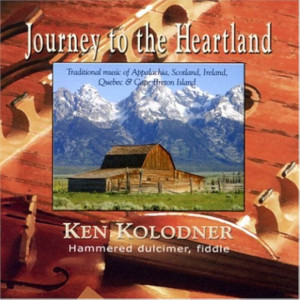 The musicianship is superb; I couldn’t fault it, neither will you, just enjoy the album.
The musicianship is superb; I couldn’t fault it, neither will you, just enjoy the album.
Another Americana album with a Celtic feel to it is Journey to the Heartland by Ken Kolodner. It consists of 12 tracks, mostly traditional music of Appalachia, Scotland, Ireland, Quebec and Cape Breton Island mixed with compositions written by Ken to good effect. On this album Ken brings together his interest in ‘old time’ music and its roots in Celtic. This album takes on a slightly different sound because Ken is an acknowledged virtuoso on both hammered dulcimer and fiddle. Ken is aided by guest musicians Robin Bullock on guitar and mandolin, Laura Risk on fiddle, Elke Baker on fiddle, and Paddy League on guitar.
It’s a delightful musical journey as the tunes take on the different rhythms and beats. Maybe because of the instruments Ken uses, the reels, hornpipes, and old time Appalachian tunes take on a refreshingly different feel and sound that we have come to accept as the norm from Celtic music  albums in general. This has to be an album that will be enjoyed by Ken’s army of fans and devotees of the hammered dulcimer.
albums in general. This has to be an album that will be enjoyed by Ken’s army of fans and devotees of the hammered dulcimer.
The Independence Suite has 15 tracks of traditional music from Ireland, Scotland and Cape Breton, performed by the various artists who are: Tommy Peoples, Geraldine Cotter, Mick O’Brien & Caoimhin O’Raghallaigh, Aidan McMahon & Anthony Quigney, Micheal O’hAlmhain, Dougie MacDonald, Robbie O’Connell, Maeve Donnelly, Aine Meenaghan, Gearoid O’hAllmhurain, & Patrick Ourceau, Randal Bays & Daithi Sproule, Babara MacDonald Magone & Alasdair Fraser, and Navan.
The Independence Suite is made up from selected tracks from 14 albums published by the individual performers. The theme is representing the old world and the new, the music the settlers carried with them to the new world of the USA and Canada. The album notes give extensive details of each track and where it is taken from, and indeed it encourages you to seek out each individual album, should you like what you hear. Most of the performers are not commonly known worldwide, but don’t let this put you off buying the album, especially if you are of Irish or Scottish descent.
The recorded performances are well made in a studio and most are presented in a simple, clean unpretentious manner. Most are jigs and reels, clog hornpipes and slow airs, with only three song tracks: “The Road to  Dunmoore” by Robbie O’Connell sung in Irish; “He Mo Leannan” a Scottish waulking song sung in Gaelic, and “Brid Thomais Mhurchadha” also in Gaelic.
Dunmoore” by Robbie O’Connell sung in Irish; “He Mo Leannan” a Scottish waulking song sung in Gaelic, and “Brid Thomais Mhurchadha” also in Gaelic.
This is a fine album that traditional musicians will savour, especially fiddle and flute players, I fancy. If you favour this sort of album, most of those comments could also be directed to the following two albums, Brendan Begley’s We Won’t Go Home Till Morning and At Home by Rosie Shipley & Matt Mulqueen with Peter and Trevor Shipley.
Brendan Begley is one of Ireland’s most accomplished traditional musicians. Perhaps he is more commonly known as a member of the band Boys of The Lough. However, We Won’t Go Home Till Morning is his second album flying solo, and fly he does. On this album he presents a selection of some of his favourite tunes and songs from his diverse repertoire.
Brendan plays the melodeon and accordion with some of the nimblest fingers in the West! His skill as a musician is well known, but on this album the tunes are not just laid to rest there. He has enlisted some fine guest musicians to accompany him on various tracks including Frankie Lane on 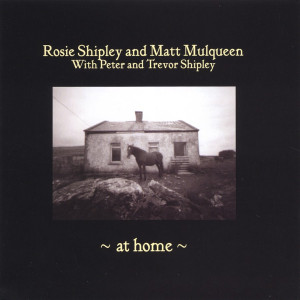 guitar, Brid Cranitch on keyboards, Liam O’Flynn on flat pipes, Stephen Cooney on bass and keyboards, and Dermott McLaughlin on fiddle.
guitar, Brid Cranitch on keyboards, Liam O’Flynn on flat pipes, Stephen Cooney on bass and keyboards, and Dermott McLaughlin on fiddle.
The album has 12 tracks with 10 tunes — jigs, reels, polkas, and hornpipes — and two songs, ‘The Kerry Hills’ and ‘Calin Na Gruage Doinne’, the latter sung in Gaelic. Part of the sleeve notes are in Irish Gaelic (I think). In the notes I must bow to his quote, ‘I have put my heart and soul into this recording, and as they say, “That’s my story and if there’s a lie in it, we’ll leave it there.” ‘
Rosie Shipley & Matt Mulqeen hail from Maryland, but are of Irish decent. I thought At Home had a strong Scottish sound to it. This probably due to the piano vamping chords as a backing to Rose’s fiddle. To be fair, it does however say on the back cover ‘file under Celtic/Irish’.
Having the fiddle and the piano as main instruments, the album has a nice homespun feel to it, as opposed to the big band festival sound so common at the moment. I liked it, and I think you may too. This less fussy parlour approach to the tunes has the advantage of you being able to savour the melody in the jigs and reels, etc. It’s a fine album that will be a must and 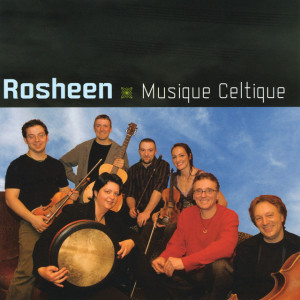 maybe a learning curve for fiddle players. The presence on various tracks of Peter Shipley on fiddle and Trevor Shipley on uilleann pipes, adds variation to the tunes where needed.
maybe a learning curve for fiddle players. The presence on various tracks of Peter Shipley on fiddle and Trevor Shipley on uilleann pipes, adds variation to the tunes where needed.
Rosheen and Dochas are two big bands, with the big band sound, but here again, each is sufficiently different.
Rosheen is a seven-piece band from Quebec, Canada. Musique Celtique is their debut album and is very impressive. The band are Lynn Vallieres lead vocalist, Gregorie Painchard piano, violin, mandolin and vocals; Kattialline Painchard violin and harp; Domonic Painchard bass, cello and vocals; Francois L’Abbe on transverse and Irish flutes, recorder and tin whistle; Michel Henault acoustic guitar and vocals; and Christian Parc on percussion. Guest Jocelyn Guillamette plays violin.
They play a nice selection of traditional Irish-style jigs and reels. But a big plus for the band is that they also have some original works written by band members Gregoire Painchard, Lynn Vallieres and Michel Hennault. These are ‘Taming the Steed’, a lively tune written by Painchard; ‘Roisin Dubh’ by Hennault and sung in French; and ‘In My Dreams’, a nice ballad written by Vallieres; and ‘The Crossing’, a lively tune on the fiddle written by Painchard which is quite brilliant — you can almost smell the sea.
‘Song for Love’ is another ballad written by Lynn Vallieres. It adds just the right contrast. These lift the album on to a higher plane and makes it even more desirable. The band is very tight and the musicianship is excellent. Likewise the vocals. All in all it suggests that Rosheen is on the way up and 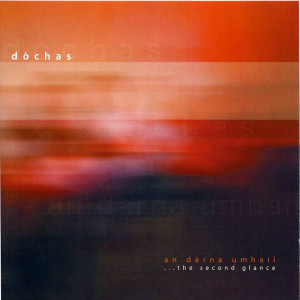 makes them a band to watch out for, particularly if they do sing songs in English a bit more, as this will certainly broaden their appeal. But I do appreciate that they are French Canadians, and so be it.
makes them a band to watch out for, particularly if they do sing songs in English a bit more, as this will certainly broaden their appeal. But I do appreciate that they are French Canadians, and so be it.
Clearly Dochas are a class band, if ever there was one. Keeping five very talented young ladies in order is a tough job, but someone has to do it, and that someone just happens to be Martin O’Neil with his bodhran. Truly, on The Second Glance this bevy of Scottish musicians play like a dream. On lead vocals and whistles is Julie Fowlis, with Eilildh MacLeod on harp and clarsach, Carol-Anne MacKay on bagpipes and accordion, Jenna Reid on fiddle and Kathleen Boyle on piano. Plus on this album they have guest musicians Ian MacDonald on whistle and Triona Ni Dhomhnaill on clavinova and vocals, and Maighread Ni Dhomhnaill also on vocals.
The Second Glance stays solidly in the Scottish traditional mode with a selection of jigs, reels, slow airs and a march, mainly from the north of Scotland and Shetland. Most of the songs are sung in Gaelic. The lead vocals are handled by Julie Fowlis who has a pleasant sweet voice. This album will please the folk purists amongst you. The pipes and accordion feature strongly in the tunes, with plenty of swirl from Carol-Anne’s highland pipes.
This truly is an extremely nice album of music from the north of Scotland and at its very best, nicely performed and beautifully sung, and I don’t give 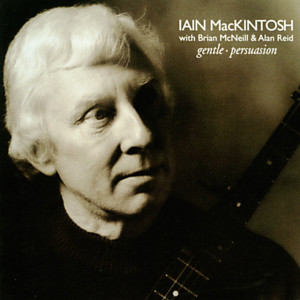 a damn if I can’t understand the lyrics for most of it — there is a translation in the booklet. It’s only on the second song of the last track ‘I Ho Ro’s Na Hug Oro Eile’ twinned with ‘Ae Fond Kiss’ that Julie lapses into English.
a damn if I can’t understand the lyrics for most of it — there is a translation in the booklet. It’s only on the second song of the last track ‘I Ho Ro’s Na Hug Oro Eile’ twinned with ‘Ae Fond Kiss’ that Julie lapses into English.
In the lowlands of Scotland, around the folk clubs you are likely to find singers such as Iain Mackintosh and Jim Reid plying their trade. Iain Mackintosh’s Gentle Persuasion is an aptly named album, for Iain sings and accompanies himself with a five-string banjo in a smooth unassuming fashion. Guest musicians Allan Reid of the Battlefield Band on keyboards and backing vocals, and Brian McNeill on guitar, fiddle, concertina, cittern, and also backing vocals, accompany him.
Iain sings well with an unpretentious, gentle style. His diction is very clear so you are able to hear all the lyrics. This is very important because of the songs Iain performs here. All are contemporary with strong entertainment qualities. Songs such as ‘Run The Film Backwards’ (Sydney Carter), ‘The January Man’ (Dave Goulder) ‘Waltzing around in the Nude’ (Dick McCormack) and Fred Small’s ‘Wheelchair Talking Blues’ are amongst my favourite tracks and will give you an idea of the albums’ content, 13 tracks in all.
This is a long-awaited (12 years) album from its initial concept, born out of a conversation after a concert between Iain and Brian McNeil and Alan Reid. The plum on the album, if you are looking for something you don’t hear too often, is the last of the 13 songs here and it’s Iain’s own composition ‘Five ways to Kill a Man’. The words are taken from the poem by Edwin Brock and put to music by Iain.
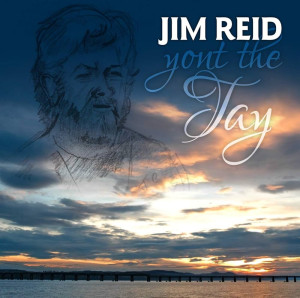 This is a fine album exemplifying the good contemporary songs you often find sung around the clubs but never seem to get on albums. Nice one Iain, well done!
This is a fine album exemplifying the good contemporary songs you often find sung around the clubs but never seem to get on albums. Nice one Iain, well done!
Presenting the other type of song coming from Scotland is Jim Reid’s Yont The Tay album, another classic not to be missed. Jim presents an album of carefully chosen traditional songs with two of his own. The first is ‘Up The Noran Waters’, a song of unrequited love, perhaps, with words by Helen Cruickshank. The other is ‘The Wild Geese’, with words by Violet Jacob and music by Jim Reid.
Jim was born in 1934 and has been singing around folk clubs and festivals for over 40 years. He sings with his own ‘Angus’ accent, which to my mind suits the material he has chosen for this album. From the opening song ‘Daft Donal’ to ‘Mormond Braes’ to ‘Harlaw’ with softer songs such as ‘The Sodgers Cairn’, I always think they only sound as they should when sung by a Scotsman; perhaps I am biased, but they lose that extra warmth and feeling when sung by anyone from south of the border.
Jim sings in a natural voice, letting the melody carry the song, and the accompaniments are kept to the minimum. Jim plays guitar and has guest musicians Aran Jones on cittern, Frank McLaughlin on guitar, Sandy Breckin on accordion, Ian Anderson on bouzouki and mandolin, Marc Duff on whistles and recorder with Malcolm Stitt on bouzouki. The entire song accompaniment is tastefully done, which will please the traditional folk 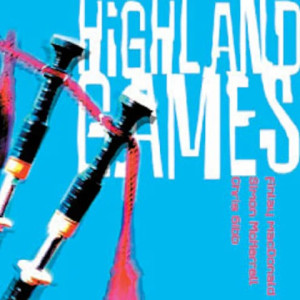 purists amongst you. All in all this is a nice album Jim should be rightfully proud of.
purists amongst you. All in all this is a nice album Jim should be rightfully proud of.
It’s not right or proper to leave the majesty of Scotland without having a look at an album of pipe music. Highland Games by Finlay MacDonald, Simon McKerrell, and Chris Gibb contains some of the great pipe tunes of Scotland, played by some of the most talented young pipers around today. But add to this the skill of a band with trombone, etc., and this is where the ‘games’ comes in as they experiment with the backing and arrangements. The result is electrifying as the music takes on another mode. They say you either love or hate bagpipes, but the net result of this album is very interesting and entertaining, to say the least. Some of the tunes are traditional and others by more modern contemporary writers of pipe music. The pipes are played by Finlay, Simon, and Chris, and the band musicians here are Johnny Hardie on guitar, Brian McAlpine on piano and keyboards, Aron Jones on bass and bouzouki, Ian Copeland on drums and percussion and Rick Taylor on trombone.
I liked the album, but the jury’s still out on whether it will be to everyone’s taste. One thing is for sure: the piping is extremely well played. But if you are expecting the traditional Edinburgh military tattoo pipe band, it isn’t. It is much better than that; it takes the bagpipes onto another plane! You will have to get it and make your own mind up, but if you are a fan of The Wicked Tinkers, chances are you will like this one. My favourite track has to be ‘Hector The Hero’ — superb!
(Sain, 2002)
(Little Cat CDs, 2004)
(Maggie’s Music, 2005)
(Celtic Crossing, 2004)
(Kells Music, 1997)
(Shipwhistle, 2002)
(Compass Records, 2005)
(SkyeCD, Macmeanmna, 2005)
(Greentrax Recordings, 1996)
(skyeCD, Macmeanmna, 2005)
(Greentrax Recordings, 2005)
